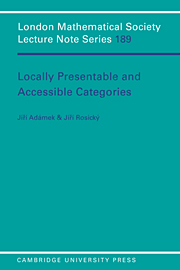0 - Preliminaries
Published online by Cambridge University Press: 15 December 2009
Summary
This monograph is devoted to a theory of locally presentable categories and accessible categories. We assume that the reader has basic knowledge of categories, functors, and adjoints, but we are careful to explain all the necessary concepts of model theory, logic, and set theory, as well as all the more advanced categorical notions in the text. We have concentrated all the required facts concerning cardinal numbers in the Appendix. We now recall some conventions and facts of category theory necessary for avoiding later misunderstandings. The proofs of the (standard) statements presented here can be found e.g. in [Adamek, Herrlich, Strecker 1990].
0.1 Set Theory. We distinguish, as in the Bernays-Gödel set theory, between sets and classes. Until Chapter 6 this is all that need be said—in other words, we just use naive set theory with a distinction between “small” and “arge”. But we use transfinite induction frequently; thus, the axiom of choice (for classes) is assumed without mention.
The first infinite cardinal is denoted by ω or ℵ0, the next one by ω1 or ℵ1. Categories κ are understood to be locally small, i.e., objects and morphisms form classes κobj and κmor, respectively, whereas hom(A, B) is a set (for any pair A, B of objects). A class of objects of a category is called essentially small if it has a set of representatives w.r.t. isomorphism.
0.2 Composition is written from right to left, that is, if / : A → B and g: B → C are morphisms, then g. f [or gf] is their composite.
- Type
- Chapter
- Information
- Locally Presentable and Accessible Categories , pp. 1 - 6Publisher: Cambridge University PressPrint publication year: 1994

